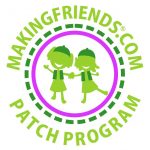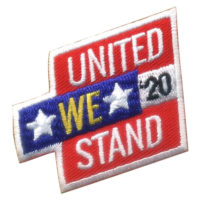United We Stand 2020 Patch Program®

 This 2″ iron-on embroidered patch is part of our patch program®.
This 2″ iron-on embroidered patch is part of our patch program®.
Talk about the various roles people had to take on during the pandemic.
2″ Iron-On Embroidered Patch
Suggestions for how younger girls can earn the United We Stand 2020 patch:
- Ask your girls about essential workers during social distancing to prevent the spread of COVID-19.
- They will probably think of the usual emergency workers: doctors, nurses, firefighters and police.
- Do they know that grocery and restaurant workers, truckers and many others put on masks and gloves and left the safety of their homes to keep essential services available?
- How many other essential workers can they think of? Offer hints such as: How did they get mail and other deliveries. Was the garbage still picked up?
- Schools needed to close in order to help prevent the spread of the virus.
- How did your scouts continue their education while at home?
- Talk about what the teachers had to do differently.
- What did their school district do to help those who did not have the resources to continue their education at home.
- Discuss the extra effort parent had to make to take on education roles they may not have been prepared for.
Suggestions for how pre-teens and teens can earn the United We Stand 2020 patch:
Complete the above requirements PLUS:
- Non-essential workers stayed home despite hardships of lost income and the struggle with learning how to keep education and businesses running as best as possible from home.
- What non-essential functions can your scouts name and what impact did it have on them or their family? (nail and hair salons, no eat in restaurants, dance studios, etc)
- What effects do they think closing businesses had on the workers?
- As food pantries depleted, many scouts and community volunteers had to re-think how to replenish them. What was different about food drives and other community service activities while practicing social distancing?
Suggestions for how teens can earn the United We Stand 2020 patch:
Complete the above requirements PLUS:
- Nursing homes experienced near complete lock-downs with families not able to visit loved ones.
- Ask your scouts to think about how that might have felt from the prospective of the disabled or seniors in the facility.
- How do you think it felt as a family member who could only see their loved ones through locked doors and windows or with virtual visits.
- What effect do your scouts think the lock-downs have on the employees.
- Many disabled and elderly receive full time care either in their own home or they are living with family members.
- There are many people who live alone but require daily support from family and caregivers to help with food, medicine, cleaning or hygiene. What challenges do your scouts think the people faced giving care to those in need while trying to maintain social distancing?
- There are many people living with family members who provide 24/7 care to help with mobility issues, dementia and chronic illnesses. Caring for someone else 24/7 can be physically demanding and very stressful. Many of these families receive outside support in the form of senior day care, family in other households relieving the main caregivers or professional aids. Many disabled and elderly were at high risk and keeping person to person interactions limited was in their best interest. How do you think the lack of support affected the main caregivers? Do you think at some point the needs of the caregiver to have support might have outweighed the need to keep the disabled or elderly isolated?
- Do you think isolation had more negative affect on the disabled and elderly than the rest of society?
- What do your scouts think the long-term effects, if any, will be be on small businesses in their community?